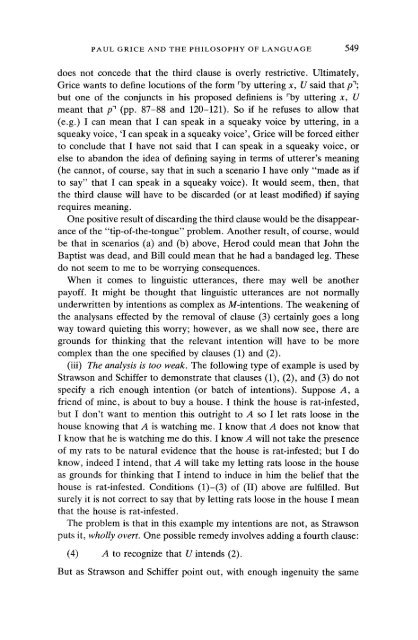Paul Grice and the philosophy of language
Paul Grice and the philosophy of language
Paul Grice and the philosophy of language
Create successful ePaper yourself
Turn your PDF publications into a flip-book with our unique Google optimized e-Paper software.
PAUL GRICE AND THE PHILOSOPHY OF LANGUAGE 549<br />
does not concede that <strong>the</strong> third clause is overly restrictive. Ultimately,<br />
<strong>Grice</strong> wants to define locutions <strong>of</strong> <strong>the</strong> form qgy uttering x, U said that pT;<br />
but one <strong>of</strong> <strong>the</strong> conjuncts in his proposed definiens is ~by uttering x, U<br />
meant that p~ (pp. 87-88 <strong>and</strong> 120-121). So if he refuses to allow that<br />
(e.g.) I can mean that I can speak in a squeaky voice by uttering, in a<br />
squeaky voice, 'I can speak in a squeaky voice', <strong>Grice</strong> will be forced ei<strong>the</strong>r<br />
to conclude that I have not said that I can speak in a squeaky voice, or<br />
else to ab<strong>and</strong>on <strong>the</strong> idea <strong>of</strong> defining saying in terms <strong>of</strong> utterer's meaning<br />
(he cannot, <strong>of</strong> course, say that in such a scenario I have only "made as if<br />
to say" that I can speak in a squeaky voice). It would seem, <strong>the</strong>n, that<br />
<strong>the</strong> third clause will have to be discarded (or at least modified) if saying<br />
requires meaning.<br />
One positive result <strong>of</strong> discarding <strong>the</strong> third clause would be <strong>the</strong> disappearance<br />
<strong>of</strong> <strong>the</strong> "tip-<strong>of</strong>-<strong>the</strong>-tongue" problem. Ano<strong>the</strong>r result, <strong>of</strong> course, would<br />
be that in scenarios (a) <strong>and</strong> (b) above, Herod could mean that John <strong>the</strong><br />
Baptist was dead, <strong>and</strong> Bill could mean that he had a b<strong>and</strong>aged leg. These<br />
do not seem to me to be worrying consequences.<br />
When it comes to linguistic utterances, <strong>the</strong>re may well be ano<strong>the</strong>r<br />
pay<strong>of</strong>f. It might be thought that linguistic utterances are not normally<br />
underwritten by intentions as complex as M-intentions. The weakening <strong>of</strong><br />
<strong>the</strong> analysans effected by <strong>the</strong> removal <strong>of</strong> clause (3) certainly goes a long<br />
way toward quieting this worry; however, as we shall now see, <strong>the</strong>re are<br />
grounds for thinking that <strong>the</strong> relevant intention will have to be more<br />
complex than <strong>the</strong> one specified by clauses (1) <strong>and</strong> (2).<br />
(iii) The analysis is too weak. The following type <strong>of</strong> example is used by<br />
Strawson <strong>and</strong> Schiffer to demonstrate that clauses (1), (2), <strong>and</strong> (3) do not<br />
specify a rich enough intention (or batch <strong>of</strong> intentions). Suppose A, a<br />
friend <strong>of</strong> mine, is about to buy a house. I think <strong>the</strong> house is rat-infested,<br />
but I don't want to mention this outright to A so I let rats loose in <strong>the</strong><br />
house knowing that A is watching me. I know that A does not know that<br />
I know that he is watching me do this. I know A will not take <strong>the</strong> presence<br />
<strong>of</strong> my rats to be natural evidence that <strong>the</strong> house is rat-infested; but I do<br />
know, indeed I intend, that A will take my letting rats loose in <strong>the</strong> house<br />
as grounds for thinking that I intend to induce in him <strong>the</strong> belief that <strong>the</strong><br />
house is rat-infested. Conditions (1)-(3) <strong>of</strong> (II) above are fulfilled. But<br />
surely it is not correct to say that by letting rats loose in <strong>the</strong> house I mean<br />
that <strong>the</strong> house is rat-infested.<br />
The problem is that in this example my intentions are not, as Strawson<br />
puts it, wholly overt. One possible remedy involves adding a fourth clause:<br />
(4) A to recognize that U intends (2).<br />
But as Strawson <strong>and</strong> Schiller point out, with enough ingenuity <strong>the</strong> same














